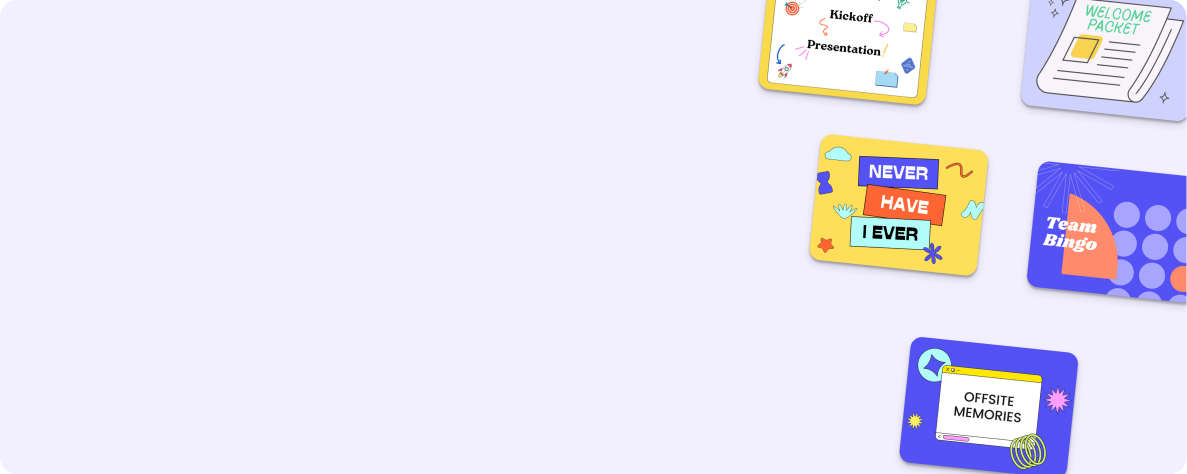6 Ways to Incorporate Mental Health into Your Company Offsite
Guest Posts
6 Ways to Incorporate Mental Health into Your Company Offsite
BoomPop Team · 10/3/2023Mental health continues to rise as a top health concern globally and was named in a recent study as one of the top 10 public health challenges in 2023. Increasingly, workers want cultures of support around mental health—not only resources, but also open conversations, healthy work norms, and advocacy from their employers.
Mind Share Partners is a nonprofit changing the culture of workplace mental health. We’ve partnered with global organizations across industries and sizes to create mentally healthy workplaces. This includes leading interactive training, advising, and transformation like facilitating immersive storytelling and training experiences for team retreats and offsites.
Based on our work, we have seen meaningful change happen with six programming ideas to incorporate conversations and learning around mental health into your offsite. We’ve also included the typical time required during your offsite and the critical stakeholders for each strategy to help you plan.
1. Spotlight a Senior Leader’s Personal Story
Time required: 5-15 minutes | Typical stakeholder: Senior leader
One of the most impactful ways to create safety around mental health at work is genuine messages from organizational leaders about their own personal mental health journeys. Doing so helps normalize the conversation. Check out these stories:
Eventbrite CHRO, David Hanrahan, on his experience with suicidal thoughts
Glassdoor’s Chief People Officer, Carina Cortez, on postpartum depression
Indeed’s SVP of HR, Paul Wolfe, on OCD
Levi Strauss’s SVP and CHRO, Tracy Layne, on burnout
Mind Share Partners coaches leaders (at Oportun, for example) who want to share their unique stories about their connection to mental health directly or in a supportive capacity. We call these “leader ally stories.” In our experience, the most successful leader ally stories typically:
Model vulnerability, while still being hopeful and genuine
Acknowledge their story as part of a spectrum of mental health experiences
Emphasize that mental health is a priority at their organization
Encourage others to join the conversation, whether personally or as an ally
Articulate a vision for what they hope the culture of mental health can be at their organization
Leaders’ shares are often met with an outpouring of appreciation, support, and validation by employees across the organization. With that in mind, explore opportunities to consistently share these messages from leaders—for example, during new employee welcomes, May Mental Health Awareness Months, or end-of-year wrap-up statements. See our Leaders Go First campaign for more examples of leader ally stories,
2. Feature Stories from Employees
Time required: 60-90 minutes | Typical stakeholders: Individual employees, HR or equivalent
Storytelling certainly isn’t limited to senior leaders. We’ve seen great success for employers and Mind Share Partners clients, such as Genentech & Roche, who organize longer storytelling sessions with individual employees volunteering to share their own stories around mental health. Featuring stories from a variety of individuals helps illustrate the wide range of mental health experiences across identities, backgrounds, roles, seniority levels, and more. Ultimately, these stories cultivate a shared understanding that mental health is something that everyone has and experiences.
If you pursue employee storytelling, our guidance is to:
Involve HR early to ensure you’re navigating these conversations in a sensitive way
Always give the employee control over what’s shared and how
Offer coaching or a pre-approved list of questions so both parties are aligned
Ensure a diverse range of stories and people (including social identities, kinds of mental health experiences, and more)
Create multiple opportunities for sharing to ensure these are not one-off conversations
3. Explore the Intersections of Mental Health & DEI
Time required: 30-90 minutes | Typical stakeholders: Employee resource groups, external speaker
Mental health is intrinsically tied to our identities, backgrounds, and experiences. From the marginalization of trans people, to violence and discrimination on the basis of race, to the ways men have been shamed for emotional vulnerability, every community has its own unique experience around mental health, stigma, and the workplace.
Exploring the intersections of mental health and DEI can be organized by HR or People Teams, employee resource groups, and external speakers. They often require a level of discretion, expertise, and trust to facilitate potentially challenging or sensitive topics productively. When Mind Share Partners has facilitated similar conversations—at Reed Smith’s DEI Summit, for example—meaningful conversation, learning, and even healing have happened. Sustained impact is even greater when these conversations are held multiple times a year, corresponding to the variety of awareness days, weeks, and months in recognition of specific communities.
4. Co-create Team Working Styles and Norms
Time required: 60 minutes | Typical stakeholders: Managers and team members
When we think about mental health at work, we often think about stigma, therapy, mental health days, or mindfulness apps. Equally important, however, is your organization’s culture of work itself. In fact, over half of workers said their work or workplace environment negatively impacted their mental health, and research has shown the workplace can actually cause the development of mental health conditions regardless of pre-existing conditions.
Mind Share Partners facilitates conversations around work culture and norms as a core part of our training and advising work. In our experience, teams who proactively discuss their individual working style preferences and how these can be formalized into team-wide norms can create healthier and more sustainable cultures of work.
Here are just a few practices and norms to consider as you explore these conversations:
Breaks and reflection (e.g., scheduling transition time between meetings, creating space for quiet reflection during group discussions, etc.)
Boundaries (e.g., calendar holds for protected work time, turning off notifications, or scheduling emails after hours)
Project management (e.g., establishing clear deadlines, priorities, and roles; sending agendas for meetings)
Social support (e.g., intentional check-ins between managers and team members, creating space for connection during team meetings, etc.)
These conversations create inclusivity within teams and can surface issues and opportunities for an organization to optimize its systems, processes, and staffing. Ensure that these conversations around work culture are routinely visited, such as before and after project scopes, busy times of the year, during onboarding of new team members, and more.
5. Showcase the Spectrum of Mental Health
Time required: 60-90 minutes | Typical stakeholders: Individual employees
Looking for a more immersive experience? You can model a live, interactive discussion around employees’ experiences and sentiments about mental health at work like this one by media company Jubilee.
In a large room or conference call, map out sentiments from “Strongly Agree” to “Strongly Disagree.” In a series of rounds, pose a question or statement about mental health. These statements can look like:
“Mental health was talked about in my family, childhood, or upbringing.”
“I feel comfortable talking about my mental health at my company.”
“My identity has played an influential role on my mental health.”
For each statement, have employees move to the sentiment that most represents their experience or perspective. Remember to always give employees the option to pass or offer no opinion, and consider inclusive practices for those with accessibility needs. After that, offer space for personal shares from the group.
Ultimately, this activity is an excellent way to make the conversation around mental health more personal and participatory, often leading to critical discussions about just what it means to navigate mental health in an organization.
6. Bring Formal Mental Health Training to Your Workforce
Time required: 60-120 minutes | Typical stakeholders: Varies
The ideas thus far have primarily focused on storytelling, discussion, co-creation, and immersive experiences. Yet, employers are increasingly seeking to equip their people with the knowledge and concrete skills to apply to day-to-day work practically. From manager training to executive strategy sessions to HR-specific sessions, formal training around workplace mental health helps translate intent into action. Training can cover key topics like navigating 1:1 conversations around mental health, creating sustainable work cultures, developing an effective mental health strategy, being a proactive ally and creating psychological safety, and more.
Mind Share Partners has facilitated hundreds of trainings across companies, seniority levels, industries, and global regions. Here are just a few key considerations when pursuing formal mental health training based on our experience:
Emphasize proactive and preventative approaches to supporting mental health at work—not reactive coping skills or crisis prevention
Ensure that each session is tailored to the organization, industry, and role
Focus on concrete strategies, action, and skill-building—not just knowledge for knowledge's sake
Incorporate the principles and learnings from the session into your organization’s infrastructure (e.g., manager onboarding, employee engagement measures, company policy)
Tailoring Your Experience Is Key
While each strategy has its own unique value add, it is important to tailor these experiences to your organization’s unique culture, the needs of your people, the overall flow and theme of your offsite, and to ensure these conversations are ongoing and integrated into organizational practices beyond the event (e.g., offsites, onboarding, etc.). Ultimately, every organization, team, and setting will need a different type of session, topic, and approach to discussing mental health at work. The most important thing is to take the first step and continue the conversation to ensure mental health remains a priority at your organization.
About Mind Share Partners
Mind Share Partners is a national nonprofit changing the culture of workplace mental health so that both employees and organizations can thrive. They build public awareness, host a community to support mental health ERG leaders, and provide custom workplace training, advising, and transformation to leading companies. Their clients span industries and include BlackRock, Genentech, Morrison & Foerster, Pinterest, Tinder, and Yahoo, among others.
They run a column on workplace mental health in Forbes and are regular contributors to the Harvard Business Review. Learn more at www.mindsharepartners.org





















